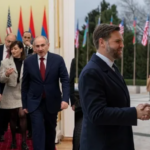The paper titled “Negotiating EU Enlargement: Scenarios for Future Integration” by Matteo Bonomi and Raffaele Mastrorocco, published by the Istituto Affari Internazionali (IAI), discusses various scenarios for the future of EU enlargement.
Key Points:
- Context and Background:
- Following the Russian invasion of Ukraine in 2022, the EU extended accession prospects to Ukraine, Moldova, and Georgia, and reinvigorated enlargement towards the Western Balkans, including countries like Albania, Bosnia and Herzegovina, Kosovo, Montenegro, North Macedonia, and Serbia.
- Challenges and Uncertainties:
- The ongoing war in Ukraine presents uncertainties regarding the EU’s approach to enlargement and integration. Questions remain about the EU’s readiness to admit new members and the security implications of such expansions.
- Negotiation Scenarios:
- The document outlines three sets of negotiations that are crucial for making EU enlargement more effective:
- Internal reforms to the EU’s own structures and policies.
- Bilateral negotiations with candidate countries focusing on meeting EU membership criteria.
- External negotiations with other global and regional powers to ensure a stable geopolitical environment.
- The document outlines three sets of negotiations that are crucial for making EU enlargement more effective:
- Fragmentation vs. Integration:
- There are two primary scenarios: one of further integration and the other of fragmentation. The integration scenario involves aligning candidate countries closely with EU standards through external support. The fragmentation scenario sees a more divided EU, with ineffective governance and reduced global influence due to internal and external challenges.
- Geopolitical Factors:
- The international context, characterized by geopolitical rivalries and potential domestic political shifts, will impact the EU’s enlargement policy. The EU’s approach must address complex post-war scenarios, especially in Ukraine, which faces significant governance challenges.
- Strategic Convergence:
- A strategic convergence among EU member states is necessary to agree on a tangible and effective enlargement policy. The document stresses the importance of a differentiated approach to integration that supports political and economic convergence with the EU and its neighbors.
Conclusion:
The success of EU enlargement hinges on navigating internal reforms, effective bilateral negotiations with candidate countries, and managing external geopolitical pressures. The process must ensure that any differentiation strengthens the EU’s overall functionality and leads to sustainable integration.
This summary encapsulates the primary scenarios and considerations outlined in the document regarding the future of EU enlargement.
Authors: Matteo Bonomi & Raffaele Mastrorocco
In the wake of the Russian invasion of Ukraine in 2022, the European Council extended EU accession prospects to Ukraine, Moldova and Georgia, while reinvigorating enlargement towards the Western Balkans (Albania, Bosnia and Herzegovina, Kosovo, Montenegro, North Macedonia and Serbia). These actions signal European unity in response to Russian aggression and highlight the importance of the EU’s enlargement policy for peace and stability in Europe. Despite renewed focus, uncertainties remain regarding the approach to enlargement and EU integration. Key issues include the EU’s readiness to welcome new members, security implications and the success of ongoing negotiations. These negotiations cover internal EU reforms, revisions to enlargement policy, and restructuring European security architecture. The outcomes will shape the EU’s ability to accept new states and maintain functionality. As the EU prepares for its next institutional cycle, strategic convergence and gradual, differentiated integration are essential. Effective negotiations and reforms could create a cohesive, flexible EU, while failure risks fragmentation and reduced global influence. The future of EU enlargement depends on navigating these complex challenges.
Source: Istituto Affari Internazionali







